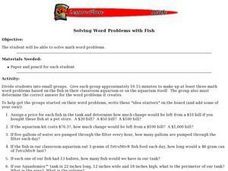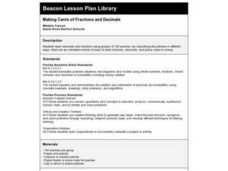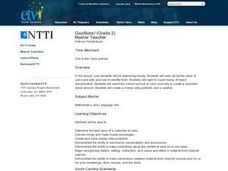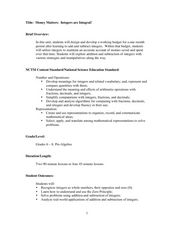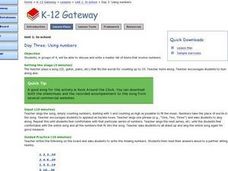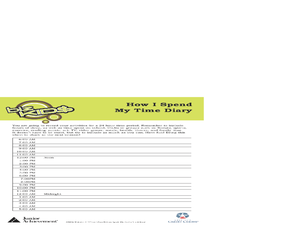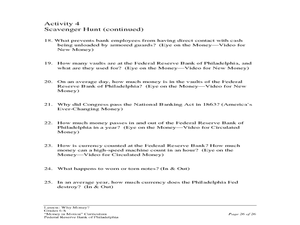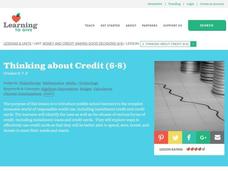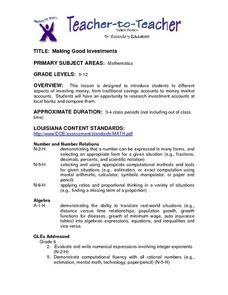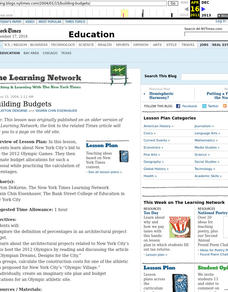Curated OER
Solving Word Problems with Fish
Send your class fishing...for the right answers! Small groups collaborate to create math word problems based on the fish in their classroom aquarium or on the aquarium itself. After all groups determine the answer for their ownproblem,...
Curated OER
Math: Navigating the World Around Me
Young mathematicians research and discuss real world math word problems and ways in which they apply math concepts in their everyday lives. They create a storyboard of a math word problem from which they create a slide for a multi-media...
Curated OER
Money Vocabulary
Explore the monetary system by completing worksheets in class. Learners will identify the monetary units of England and collaborate in groups to solve money word problems. They also identify several money-related vocabulary terms before...
Curated OER
Money Matters
Students practice spending money by completing math word sentences. In this economics lesson, students utilize problem solving strategies to complete word problems written on the board involving making purchases with money....
Curated OER
Money Makes the Fair-Go-Round
Learners explore the value of money. In this money lesson plan, students investigating combining amounts of money and making change. Learners count sets of money and make fair trades. Resources are provided.
Curated OER
Using Multiplication to Solve Word Problems
Young scholars explore math functions by solving word problems in class. For this multiplication lesson, students utilize colored cubes and base blocks to visualize multiplication problems. Young scholars identify the multiplication...
Curated OER
Making Cents of Fractions and Decimals
Students explore decimals and fractions using groups of 100 pennies. By classifying the pennies in different ways, there are an unlimited number of ways to learn fractions, decimals, and place value in money. This is a good, hands-on...
Curated OER
Buggin' Out (Identifying and Adding Amounts of Money)
Students explore consumer math by participating in estimate exercises. In this currency lesson, students identify and define each piece of U.S. currency and their value to the monetary system. Students complete several money worksheets...
Curated OER
Paws in Jobland Number Crunch
Learners analyze real life jobs that involve math. They discuss jobs where math is used, and explore how math is important in many areas and research some of these jobs in the book "Paws in Jobland." They complete a worksheet with four...
Curated OER
Gazillions!
Second graders determine the total value of a collection of coins. They convert money and make money exchanges. Students create and solve money-story problems. They demonstrate the ability to summarize conversations and discussions.
Curated OER
Ancient Story Problems
Pupils research ancient civilizations, and develop story problems using symbols and coins from those times. They retell these story problems using modern terms and coins.
National Security Agency
Money Maters: Integers are Integral!
A thoroughly-written lesson plan and a plethora of worksheets about integers comprise this resource. Neophyte number crunchers learn to recognize integers, add and subtract them, and apply the concepts to the designing of a personal...
Curated OER
Gateway
Students practice listening to math problems in a foreign language. In this number sentence lesson plan, students listen to the teacher ask them a question in a foreign language that has some type of number combination for an...
Curated OER
How Much?
Fifth graders problem solve to determine if a fundraiser will be successful in the money raising activity. In this problem solving lesson, 5th graders read a book about fund raising and write down important vocabulary words. Students...
Curated OER
How to Achieve Your Financial Goals
Students explore economics by creating a budget. In this financial goal setting instructional activity, students investigate their use of time by completing a worksheet. Students identify financial goals they would like to achieve in the...
Curated OER
Why Money?
Students participate in a trading simulation to learn about barter and the benefits of using money. In this barter lesson, students participate in a trading simulation and learn about coincidence of wants. Students then use money cards...
Curated OER
Thinking About Credit
Middle schoolers examine the use of credit such as installment purchases and credit cards. In this credit instructional activity, students learn the vocabulary associated with credit usage such as mortgage, credit report/score, and debit...
Alabama Learning Exchange
Pat Brisson's Benny's Pennies
Learners listen to the book, "Benny's Pennies" and conduct math and language arts lessons to go along with the book. They demonstrate their ability to count pennies, understand proper sequence, and rewrite a story using different...
Curated OER
Waste Audit
Students engage in a lesson that is concerned with the concept of mental math. They perform calculations as following: recognizing a half, three quarters, and tenths. Students are also challenged to extend skills to making calculation...
Curated OER
Making Good Investments
Students compare different aspects of investing money from traditional savings accounts to money market accounts. They research investment accounts at local banks and compare them.
Curated OER
The Grouchy Ladybug
Students complete a Cirlce Map about time. They recall times during the grouchy ladybugs travels, and add dots on ladybugs using turn-around facts. Pupils correctly sequence the events of The Grouchy Ladybug. Students compose new...
Curated OER
Building Budgets
Students explore New York City's bid to host the 2012 Olympic Games. They estimate budget allocations for such a proposal while practicing the calculation of percentages.
Curated OER
Oral Language in Mathematics
Third graders examine fractions by descriptively writing about them. For this number sense lesson, 3rd graders read number sentences and compare fractions based on their size. Students explain fractions to a friend by writing a friendly...
Curated OER
Where In the World Are We?
Fifth graders read postcards and find their locations on maps. They use the pictures and text on the postcards to write about imaginary vacations. They compute the mileage and compare it to TripMaker data.
